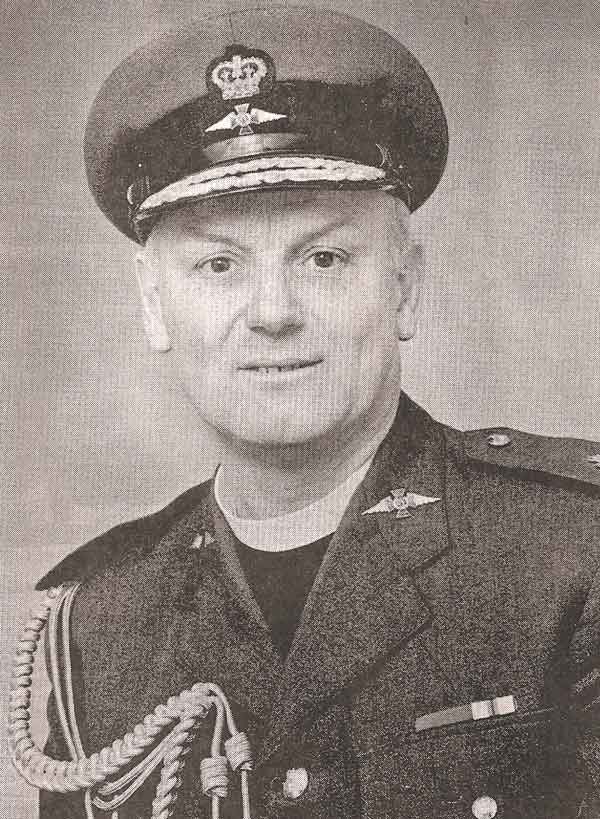
Wilson: his appointment as chaplain at RAF Cranwell was considered 'an inspired choice'
Longest-serving RAF Chaplain-in-Chief who provided strong
leadership at a time of cutbacks in manpower.
 THE VENERABLE HEWITT WILSON
THE VENERABLE HEWITT WILSON, who has died aged 84, had the distinction of being the longest-serving RAF Chaplain-in-Chief in the service's 90-year history.

The post, which carries the honorary rank of air vice- marshal, is the senior chaplain's appointment in the RAF. Wilson was appointed in 1973 and served for seven years. This was a period that covered turbulent times in the service, including a morale-sapping redundancy scheme, during which
Wilson's strong leadership, compassion and understanding were much in evidence.

His post also carried with it the appointment of canon and prebendary of Lincoln Cathedral, an establishment with a unique relationship with the RAF, and in particular with Bomber Command.
 John Hewitt Wilson
John Hewitt Wilson was born on St Valentine's Day 1924 at Worcester, Massachusetts, where his father was working. His family returned to farm near Cork, in Ireland, when
Wilson was two. He was educated at Kilkenny College and Mountjoy School in Dublin before entering Trinity College Dublin, to graduate with a First in Oriental Languages and Theology in 1947.
 Wilson
Wilson was an outstanding sportsman and earned his university colours at rugby, athletics and tennis. He went on to play threequarter for Leicester and also for the RAF, when he was its only non-international to play for it regularly.

After graduation
Wilson served for three years as a curate at St George's Church, Dublin, before taking a commission in the RAF Chaplain's Branch in 1950. For the first 10 years of his service he served on flying stations, most notably in Aden and
Germany.
 Wilson's
Wilson's gentle, easy-going and caring manner allowed him to establish a unique relationship with the station officers, airmen and their families. He liked nothing better than the company of young fighter pilots and their groundcrew - not a breed which always looks upon the padre as a chum - and enjoyed sitting in their crew rooms or in the bar at "happy hour" listening to their tales and banter. He also developed a well-tuned ear for the state of morale in the unit, which was of great value to the station commander, to whom the chaplain always had direct access.
 Wilson
Wilson served as the staff chaplain to the RAF's Chaplain-in-Chief, the Venerable Frank Cocks, who later became the Bishop of Shrewsbury - a period that had a profound influence on his approach to his later career and ministries. In 1963 he was appointed senior chaplain at RAF Cranwell, an appointment described by a colleague as "an inspired choice". He then served as the Assistant Chaplain-in-Chief at the HQ Far East Air Force, and in 1969 he filled a similar appointment at the Strike Command at High Wycombe. Three years later he was appointed Honorary Chaplain to the Queen, and the next year he was made Chaplain-in-Chief.
 Wilson
Wilson set, expected and demanded high standards of his chaplains, seeking their views on key matters (asking them to give it to him straight), before deciding on which course of action to take or recommend. He could be hard but was always fair and consistent in his dealings with those who needed a sharp reminder of what was expected of them. There was never any malice in his reprimands; the "rocket" was delivered in a quiet, gentle manner in his Irish lilt, and the matter was then never
mentioned again. Together with his sincerity, integrity and sense of fun and
humour, these qualities made
Wilson a most effective, respected and well-liked
Chaplain-in-Chief. In 1977 he was appointed
CB.

On his retirement from the RAF in 1980,
Wilson was appointed Archdeacon Emeritus and Canon Emeritius of Lincoln Cathedral, the latter a distinction shared with only one other RAF chaplain.

In 1991 he was appointed Rector of Somerton, the Heyfords and Rousham, in north Oxfordshire, where his uncomplicated faith and straightforward ministry soon revitalised the four parishes. He and his wife provided unstinting hospitality, and they immersed themselves in every activity in the region. Wilson formed close relationships with the
USAF personnel at the nearby Upper Heyford airbase, who benefited from his service experience of relationships with local communities and how best to avoid conflict over any controversial issue.

So respected was he by the Americans that he was asked to marry the colonel's daughter in the ecumenical station chapel, which meant obtaining a special licence from the Archbishop of Canterbury.

One parishioner described his 12-year ministry as "a golden age for the Cherwell valley".
 Wilson
Wilson became chaplain in 1995 to the Worshipful Company of Coachmakers and Coach-Harness Makers, a City livery company involved with the automotive and aerospace manufacturing industries. His wise counsel, commitment, warm personality and sense of humour were much in evidence and appreciated by members. He went on to become an honorary assistant to the court and then Chaplain Emeritus.
 Wilson
Wilson enjoyed the theatre and travelling and he maintained his great love for sport.
 Hewitt Wilson
Hewitt Wilson died on June 29. He married
Joan Weir in 1951; she survives him with their three sons and two daughters.
